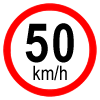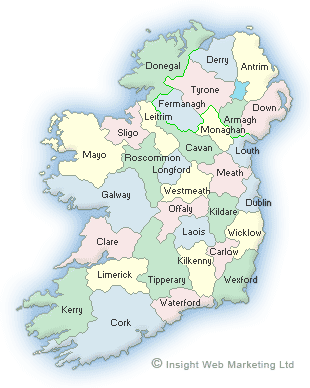Driving in Ireland
In Ireland all traffic drives on the LEFT side of the Road. The same applies to Northern Ireland as well. Most visitors to Ireland arrive in either Shannon or Dublin Airport. Neither airport is located in a City Centre and when you collect your rental vehicle you will have ample time to "acclimatise" to Driving conditions here before reaching some of the more built up area's.
If you are a visitor to Ireland it is important that you are aware of the national speed limits. Driving in excess of the speed limit may result in an on-the-spot fine of €80.

- General
- Mobile (Cell) Phones
- Driving License (Licence)
- Insurance
- Emergency Services
- Distance Calculator
General
In Ireland most cars are equipped with a Manual Transmission (Stick Shift). Automatic cars are available but are generally more expensive to rent but do make it easier to adapt to Irish driving conditions. (You can specify which transmission you would prefer when requesting a quotation).
If you are visiting us from the UK then many of our road signs, speed limits, road markings and roundabouts will be familiar to you BUT since 2005 all road signs refer to kilometres NOT miles.
If you are visiting us from continental Europe or the USA then it may take you a little while to get used to our road layouts and driving on the "other" side (left side) of the road. Irish Car Rentals supply an excellent Road Map with each of their rental cars which will help you navigate your way around our many wonderful towns, villages and visitor attractions.
On these pages we have detailed a quick guide for you to help you get acquainted before you arrive, please use the quick links above or scroll down the page for more information.
Speed Limits on Irish Roads:

As from 20 Jan 2005 all speed limits are expressed in km/h - Kilometres per hour - Speed limits are expressed through distinctive road signs. These signs are found throughout Ireland on every motorway, major and minor road..
The speed limit in kilometres is shown in the centre of the sign in black numerals. (NOTE! Before 20 January 2005 road distances were expressed in kilometres but speed limits were expressed in 'miles per hour'). The Irish police force (An Garda Siochana) is responsible for enforcing road speed limits, detecting speeding offences and initiating proceedings by issuing fixed monetary penalties to offending drivers.
There are a total of five different types of speed limits throughout Ireland:
- Town / city built up areas - 50km/h
- National Roads & Dual Carriageways - 100km/h
- Regional & local roads - 80km/h
- Motorways - 120km/h - NOTE: that learner drivers, vehicles under 50 cc, bicycles, pedestrians, animals and invalid carriages are not allowed on motorways in Ireland.
- National Roads & Dual Carriageways - 100km/h
- Regional & local roads - 80km/h
- Special speed limits - 30km/h or 60km/h
These are often applied to designated roads on the near built-up areas or schools.
Certain vehicles are subject to different speed limits than those outlined above.
- Double Deck Vehicles - 65km/h
- Buses & Coaches with more than 8 passengers 80km/h
- Towing Vehicles - 80km/h
- Trucks (with a design gross weight of more than 3,500kg) - 80km/h
Exceptions to speed limits: Speed limits do not apply in Ireland to ambulances, Garda Siochana vehicles being used in the course of duty or fire brigade vehicles.
Using a Mobile Phone (Cell Phone) whilst Driving in Ireland
The Road Traffic Act 2006 (Section 3) makes it an offence to drive a vehicle while holding a mobile phone. An offence is committed by holding a mobile phone while driving and matters such as whether or not the phone was being used or switched on at the time are not relevant.
"Bluetooth" and other hands-free devices do not come within the scope of the prohibition. The definition of 'holding a mobile phone' covers holding it by hand or supporting it with some other part of the body. The definition prohibits the practice of cradling a mobile phone in the nook of the neck and shoulder.
From Autumn, the offence will attract 2 penalty points on payment of a fixed charge and 4 penalty points on conviction. In addition, a person could face a maximum fine of €2,000 on conviction.”
As the current law stands, a driver risks getting five penalty points and a fine of up to €1,500 if the use of a mobile phone causes careless driving.
Gardaí (Police) can pursue drivers using mobile phones and charge them with careless driving even if no accident has occurred.
Gardaí also have the power to check telephone records if they suspect that a driver was involved in an accident whilst using a mobile phone.
Driving License (Licence) Information
To drive a car in Ireland, you will need a current, valid EU or American drivers licence (license) in addition to your Passport for Identification. To Hire a Car you must be in possession of a full-unendorsed driver's license. (Certain minor endorsements may be acceptable, please call us prior to booking). All drivers must have held a full driver's license for at least 12 months prior to hiring a car.
Holders of UK, US, Canadian, Australian and All EU member states are NOT required to supply an International Driving License (IDL). International driver's licenses where required MUST BE accompanied by the original domestic license of the driver. (This is clearly stated on the international license). If in Doubt please contact us.
The minimum age to rent a vehicle is 21 years (maximum 75) and drivers must have held a full driver's license for at least 12 months prior to hiring a car. Drivers under 25, i.e. between 21 and 25, (or over 70) are subject to an insurance surcharge of 8 Euro per day and you are liable for the first 1200 Euro of damage to the car (excess). The surcharge is paid when collecting of the car and is not included in the quoted price. The minimum age to be a named driver in a minivan, minibus or luxury car rental is 25 years.
If you are planning to bring your own car by ferry, it must have a current, valid EU registration. The insurance regulations and costs for private cars in Ireland are extreme. If you are visiting friends or relatives, do not expect to borrow a car.
Car Insurance in Ireland
Car Insurance in Ireland is Compulsory and all drivers need to have a minimum of Third Party Liability Insurance to drive a vehicle here. If you are visiting Ireland and bringing your car please check with your Insurance company that you are covered to drive here and it would be wise to carry details of your Insurance in case of an accident.
Irish Car Rentals provide you with the COMPULSORY Insurance's included in your car rental quotation. You will be covered for:
Third Party Liability Insurance (Damage to other vehicles and Persons)
Collision Damage Waiver (CDW) - This option limits your financial liability for damage to the Irish Car Rentals vehicle, its parts and accessories, except theft, attempted theft or vandalism, provided the vehicle is used in accordance with the terms and conditions of the rental agreement. The cover is subject to an insurance excess. If you choose a rate inclusive of CDW insurance, a CDW Excess will apply
at all times. All rentals are subject to a liability excess, ranging from EURO 600 to EURO 1000 (depending on the vehicle group rented) for which you are responsible in the event of damage to the vehicle during the rental.
Theft Loss Insurance
This insurance option limits your financial liability for loss or theft of the vehicle, its parts and accessories, provided the vehicle is used in accordance with the terms and conditions of the rental agreement. By accepting Theft Loss Insurance you are subject to a liability excess ranging from EURO 600 to EURO 1000 (depending on the vehicle
group rented) for which you are responsible in the event of damage to the Irish
Car Rentals vehicle during the rental.
MasterCard CDW Waiver
This Insurance may allow you to avoid the additional cost of the
theft and collision damage waiver (CDW) for rental cars in some countries. This
coverage is ONLY available with Gold or Platinum MasterCard's issued by US
banks. If you pay for the full rental with your eligible MasterCard card you may
be covered for up to $50,000 without excess. This is an insurance program,
certain restrictions and exclusions apply. In order to establish if your
MasterCard includes Auto Rental Insurance in the Republic of Ireland, please
call your credit card issuer and/or MasterCard in the U.S.A. before arriving on
Toll Free 1 800 6227747. This coverage is a service provided by MasterCard to
the cardholder and therefore it is the card holders responsibility to ensure
that they are adequately covered for the entire duration of the rental period.
We reserve the right to refuse third party insurance.
Additional
Insurance Cover
As said before Irish Car Rentals provide you with the
MINIMUM Car Insurance required to Drive in Ireland included in the rental
quotation. You can purchase additional cover for Personal Accident Insurance and
Super Damage Waiver Insurance (SDW) when you collect your vehicle from the
rental desks.

Emergency Police, Fire, Ambulance
Driving: Take Care, especially at Junctions. If you are unfortunate enough to have an accident you must report this to the GARDAI, (POLICE), and should do this before leaving the scene. You can contact the GARDAI from any telephone by dialling 999 or 112.
All emergency services can be contacted at any time by dialling 999 or 112 including the Fire Service, Ambulance and Coastal Rescue.
If you are DRIVING A HIRED CAR you must also inform the HIRE COMPANY. You will find their contact details on the Hire Documents you received at the time of hire.
If you have an emergency at sea, you may dial these numbers from your mobile (cell) phone if within signal range - ASK FOR COASTGUARD.
Emergencies whilst walking in the mountains - again use these numbers but be aware that it may be difficult to obtain a signal in remote areas - ASK FOR MOUNTAIN RESCUE.

Ireland Driving Distances: The driving distance calculator displays distances between Irish towns and cities but be aware driving times may not be relative to the distances shown due to the varying conditions on Irish roads. Select the Irish towns and the distance in miles or kilometres is displayed automatically.
Enjoy yourself and stay SAFE. . .
Ireland is a wonderful place to tour around, and the best way
to see most of it is by Car. So take care, drive carefully and enjoy